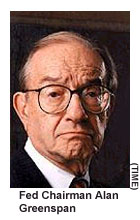|
U.S.-China trade gets push
|
 |
May 8, 2000: 3:31 p.m. ET
Greenspan, three former presidents push for approval of trade-relations bill
|
NEW YORK (CNNfn) - Federal Reserve Chairman Alan Greenspan and three former U.S. presidents threw their weight Monday behind pending legislation that would grant China permanent trading privileges in the U.S.
"The addition of the Chinese economy to the global marketplace will result in a more efficient worldwide allocation of resources and will raise standards of living in China and its trading partners," Greenspan said in a letter released on Monday to House of Representatives Banking Committee Chairman James Leach, an Iowa Republican.
 The U.S. administration signed a landmark trade agreement with China last year, calling on Beijing to open a wide range of markets. In exchange, the White House has asked Congress to grant China permanent normal trade relations (PNTR), which would allow Chinese goods low-tariff access to U.S. markets. The U.S. administration signed a landmark trade agreement with China last year, calling on Beijing to open a wide range of markets. In exchange, the White House has asked Congress to grant China permanent normal trade relations (PNTR), which would allow Chinese goods low-tariff access to U.S. markets.
"As China's citizens experience economic gains, so will the American firms that trade in their expanding markets," wrote Greenspan, a long-time proponent of reduced trade barriers.
"Further development of China's trading relationships with the United States and other industrial countries will work to strengthen the rule of law within China and to firm its commitment to economic reform," Greenspan said in the letter, a copy of which was released by Leach's office.
Former presidents weigh in
In a united stand, three former presidents Monday joined President Clinton in strongly urging Congress to grant China permanent trade benefits. "In economic terms, the case is clear," they said in an open letter.
Orchestrated by the White House, the two-page letter gives the Clinton administration more clout to persuade Congress to extend permanent trade status to China and ease the Asian nation's long-sought entry into the World Trade Organization.
"The agreement to bring China into the WTO is the product of more than 13 years of tough negotiations conducted by four administrations, Democratic and Republican," former presidents, Ford, Carter and Bush, wrote.
 "It builds upon a series of market-opening initiatives pursued by every president since the second world war. It will open China's markets to us without increasing China's access to our market," they wrote. "It builds upon a series of market-opening initiatives pursued by every president since the second world war. It will open China's markets to us without increasing China's access to our market," they wrote.
Former presidents, Ford and Carter, plan to be at the White House on Tuesday with former secretaries of state and national security advisers to rally support for the legislation. If the House approves the measure in a vote expected later this month, Senate passage is likely.
'Still much work to be done'
Labor unions and the two top House Democratic leaders are fighting the legislation, suggesting it will hurt U.S. jobs. The Clinton administration, Republican leaders and U.S. business groups have been lobbying lawmakers for weeks to get the legislation passed.
"We've made significant progress, but there's still much work to be done," White House press secretary Joe Lockhart said. "The endorsement of three former presidents should have a significant impact on members who are trying to make up their mind."
The former presidents said failure to grant China permanent normal trade-relations status would "squander" the best opportunity the United States has had in a generation to address long-standing concerns about China's trading practices.
They also said it would improve U.S.-China relations, make positive change within China more likely by opening doors to the information revolution and speeding up reforms that are dismantling many state controls over the economy and society.
"A vote against PNTR will make it far more difficult to attain these critical goals," the former presidents wrote. "It would encourage deeper tensions between Beijing and Taiwan and diminish our ability to work for Asian stability." 
--From staff and wire reports
|
|
|
|
|
 |

|

